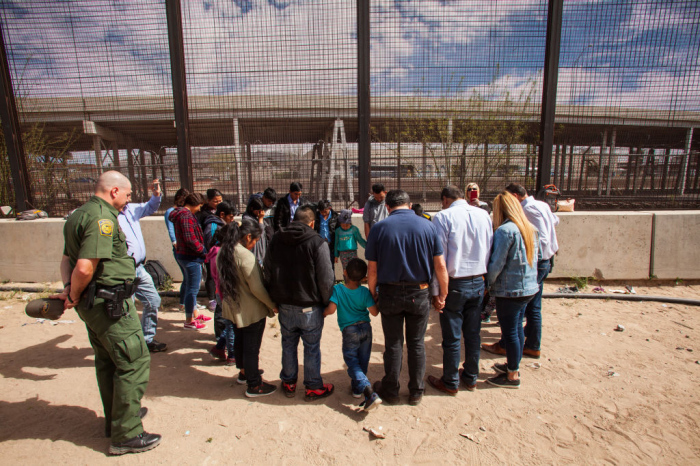DOJ halts controversial ‘zero tolerance’ immigration policy

The U.S. Department of Justice has rescinded a “zero tolerance” prosecution policy for illegal immigrants caught entering the country through the southern border, a practice that led to the separation of thousands of families.
Acting Attorney General Monty Wilkinson sent a memo to federal prosecutors Tuesday, explaining that the “zero tolerance” policy would be replaced with an approach that focuses on individual cases.
“Consistent with this longstanding principle of making individualized assessments in criminal cases, I am rescinding — effective immediately — the policy directive,” stated the Wilkinson memo, as reported by the Associated Press.
“While policies may change, our mission always remains the same: to seek justice under the law.”
The memo went on to note that “decisions about bringing criminal charges should involve not only a determination that a federal offense has been committed and that the admissible evidence will probably be sufficient to obtain and sustain a conviction, but should also take into account other individualized factors.”
These “factors” included “personal circumstances and criminal history, the seriousness of the offense, and the probable sentence or other consequences that would result from a conviction.”
In 2018, the Trump administration garnered outrage across the political spectrum for enforcing a family separation policy for immigrants seeking asylum and those who illegally entered the country.
The policy traced its origins to the Bush administration, with former Obama administration Homeland Security Secretary Jeh Johnson explaining that under President Barack Obama, some children were detained alone.
“Without a doubt the images, and the reality, from 2014, just like 2018, are not pretty,” said Johnsonin an interview with Fox News’ Chris Wallace in 2018.
“We expanded it, I freely admit it was controversial, we believed it was necessary at the time, I still believe it is necessary to remain a certain capability for families.”
In June 2018, then-Attorney General Jeff Sessions garnered controversy when he defended the policy, stating that under the law, “we are supposed to prosecute these crimes.”
“If you cross the Southwest border unlawfully, then the Department of Homeland Security will arrest you and the Department of Justice will prosecute you,” said Sessions at the time.
“That is what the law calls for — and that is what we are going to do. Having children does not give you immunity from arrest and prosecution. It certainly doesn’t give immunity to American citizens.”
In response to the nationwide outcry, President Donald Trump signed an executive order in 2018 suspending the practice of family separation, though not completely abolishing it.
In 2019, Sen. Ron Johnson, R-Wis., headed a majority staff report for the Committee on Homeland Security and Governmental Affairs, stating that the Trump administration “was forced to revert to the policy of catching and releasing families who enter illegally without being able to verify whether an actual family bond exists.”
“Without that verification, there is a real risk that human traffickers will exploit the current system,” the report reads.
At this point, as AP reports, the Biden administration’s ending of the “zero tolerance” policy will essentially “affect mostly single men who have entered the country illegally.”
A report from the Justice Department’s Office of Inspector General released this month found that the Justice Department was the “driving force” in urging the Department of Homeland Security to aggressively prosecute adults who arrive with children.
The report found that the DOJ nor the attorney general's office effectively coordinated with agencies in charge at the border or the court system prior to implementing "the new practice of referring family unit adults for criminal prosecution as part of the zero tolerance policy."
"We further found that the OAG’s expectations for how the family separation process would work significantly underestimated its complexities and demonstrated a deficient understanding of the legal requirements related to the care and custody of separated
children," the report adds. "We concluded that the Department’s single-minded focus on increasing immigration prosecutions came at the expense of careful and appropriate consideration of the impact of family unit prosecutions and child separations."
On Tuesday, a judge temporarily dealt a small blow to President Joe Biden’s immigration agenda by blocking the administration’s 100-day pause on deportations in response to a lawsuit filed by Texas Attorney General Ken Paxton.
Federal Judge Drew Tipton of the Southern District of Texas issued a temporary restraining order on the pause slated to last two weeks, reported CNN.
Tipton, a Trump appointee, ruled that Texas presented evidence that such a policy would cause the state to incur added costs because of the presence of illegal immigrants. The state argued that not removing immigrants deemed deportable will only encourage more illegal immigration.
"The Court's decision to stop the Biden Administration from casting aside congressionally enacted immigration laws is a much-needed remedy for DHS's unlawful action,” Paxton said in a statement. “A near-complete suspension of deportations would only serve to endanger Texans and undermine federal law."




























